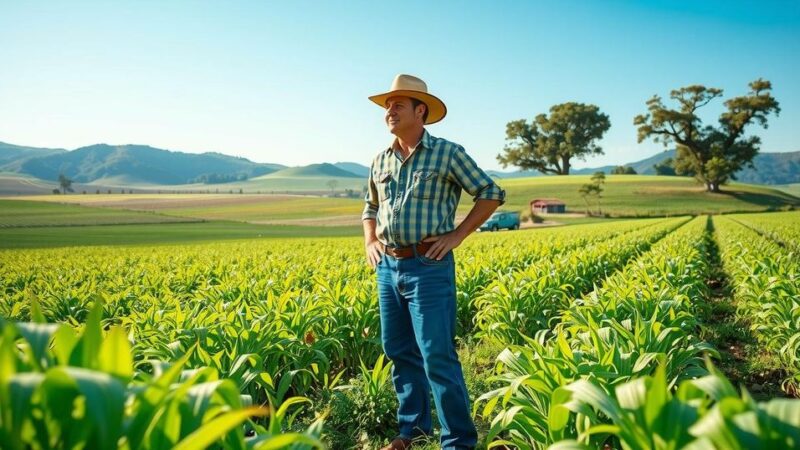Climate change is severely impacting food security, affecting availability, accessibility, utilization, and stability. Urgent action and global support for LDCs and SIDS are critical to mitigate these effects. Social protection programs have proven effective in fostering resilience, but a significant portion of vulnerable populations remain unreached. Tailored strategies are necessary to address the diverse challenges faced by different nations, emphasizing the importance of comprehensive support and investment.
Climate change is increasingly jeopardizing food security across the globe, affecting its four essential pillars: availability, accessibility, utilization, and stability. Unpredictable weather patterns and frequent extreme weather events disrupt agricultural productivity, leading to reduced food supply. Concurrently, rising food prices, socio-economic disparities, and inadequate infrastructure exacerbate food accessibility issues. Health complications related to climate change, such as increased illnesses, insufficient food storage capabilities, and a rise in pesticide usage, hinder how populations can effectively utilize food resources. Additionally, variations in income and harvests, along with disrupted supply chains, contribute to instability within food systems. Addressing food security amidst the growing impacts of climate change necessitates urgent and coordinated actions. Although known solutions exist, there remains a pronounced need for comprehensive support to least developed countries (LDCs) and Small Island Developing States (SIDS) from the global community. Brazil’s upcoming presidency during the G20 in 2024 presents an opportunity to galvanize the necessary resources and cooperation. The 2023 Synthesis Report by the Intergovernmental Panel on Climate Change (IPCC) emphasizes that climate change effects are both broader and more severe than previously anticipated, with risks intensifying. Projections suggest that by 2030, climate change could thrust an additional 100 million individuals into extreme poverty and potentially result in a loss of 72 million full-time jobs worldwide. Furthermore, water scarcity may impact approximately 3.2 billion people, with 80 million more potentially facing hunger by 2050 due to a projected 2°C rise in global temperatures. In response to climate-induced vulnerabilities, households often resort to detrimental coping mechanisms, which include skipping meals, withdrawing children from school, and selling their assets. Conversely, social protection programs play a crucial role in enhancing health, nutrition, and livelihoods. For example, the Productive Safety Net Programme (PSNP) in Ethiopia enabled households to maintain or improve living standards during droughts from 2004 to 2010, with 62% of households avoiding asset sales and 36% refraining from using savings for food. Similarly, beneficiaries of Kenya’s Hunger Safety Net experienced a stabilization of living standards during the 2008–2011 droughts, contrasting sharply with a 10% reduction in spending for those without coverage. In Bangladesh, the Challenging the Frontiers of Poverty Reduction Programme resulted in a 42% increase in per capita income and doubled household assets within three years. Globally, social protection initiatives are crucial for development, yet approximately 45% of individuals access at least one social protection program, while only about 25% of at-risk populations receive sufficient social assistance. Notably, preemptively providing social protection in anticipation of climate shocks is both financially prudent and effective for resilience-building. Studies from Ethiopia and Kenya underline that fostering resilience is more economical than reactive humanitarian measures. A comprehensive World Bank study indicates that each US dollar invested in resilient infrastructure could yield benefits amounting to four dollars, with another UN analysis suggesting that investments in risk reduction can save up to fifteen dollars in post-disaster recovery for every dollar spent. This discussion delves into the functionality and preparedness of social protection programs in securing food availability across eight nations facing diverse climate challenges. Evaluations employed the Anticipatory Social Protection Index for Resilience (ASPIRE) toolkit for Bangladesh, Ethiopia, Ghana, India, Malawi, Pakistan, Senegal, and Uganda, assessing social protection policies and systems alongside three specific social protection programs across each country. The resulting ASPIRE food security indices illustrate the effectiveness of these programs. Ethiopia consistently achieved high performance scores, particularly in utilization (78) and availability (67), a reflection of its effective targeting mechanisms, comprehensive policy frameworks, and substantial investments in infrastructure and early warning systems. Senegal also excelled in utilization (78), although it faces obstacles in extending healthcare services and aiding migrant communities. India maintained reasonable scores in availability (55) and stability (64), despite challenges surrounding financial preparedness and beneficiary identification. In contrast, Malawi scored only 33 for stability, attributed to resource shortages and heavy dependence on external aid. Bangladesh and Pakistan exhibited low scores in availability and stability due to ineffective targeting and resource challenges. Uganda and Ghana achieved moderate scores across the board, with Uganda’s anticipatory health initiatives successfully reducing malaria incidences during rainy seasons. Nonetheless, both nations require improvements in implementation practices and inter-agency collaboration. Given that LDCs and SIDS frequently possess underdeveloped early warning systems for climate threats, inefficient decision-making and coordination further delay crisis responses. Financial limitations remain significant obstacles, creating a need for tailored strategies that accommodate the specific climate vulnerabilities and social protection frameworks of each nation.
Food security is a multifaceted issue fundamentally impacted by climate change, which disrupts agricultural patterns, elevates food prices, and influences health and nutrition. The four pillars of food security—availability, accessibility, utilization, and stability—are increasingly threatened as climate change intensification leads to unpredictable weather patterns and health crises. The necessity for robust social protection systems is vital in providing resilience against these challenges. Countries that are Least Developed and Small Island Developing States face unique challenges that demand a global cooperative approach to mitigate the effects of climate change on food security.
In conclusion, the imperative to enhance food security in the context of escalating climate challenges highlights the profound need for effective social protection programs. Without prompt, concerted efforts from the global community to support LDCs and SIDS, the adverse effects of climate change on food availability, accessibility, and overall stability will continue to escalate. Strategic investments in social protection and anticipatory measures can foster resilience, enabling vulnerable populations to withstand climate-induced shocks and maintain their livelihoods.
Original Source: reliefweb.int







